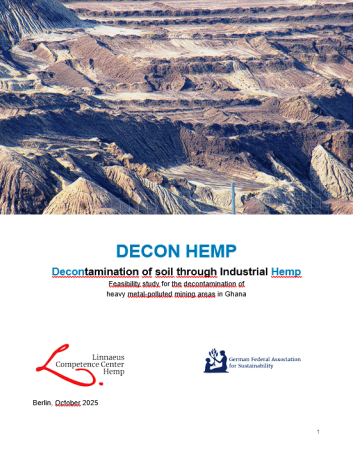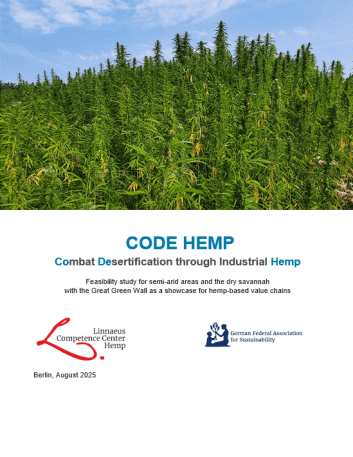Publications

DECON HEMP – Decontamination of soil through Industrial Hemp
Feasibility study for the decontamination of heavy metal-polluted mining areas in Ghana
Linnaeus Kompetenzzentrum Hanf gGmbH
Linnaeus Competence Center Hemp (Editor):
Berlin 2025
Download DECON Hemp – Feasibility Study 2025
DECON HEMP transforms mercury- and arsenic-contaminated mining land in Ghana into fertile, productive ground. Using industrial hemp (Cannabis sativa L.) and biochar, the project combines environmental restoration with sustainable economic opportunity.
Industrial hemp absorbs and stabilizes heavy metals while biochar locks pollutants and carbon safely into the soil, creating a circular, climate-positive process.
Developed by the German Federal Association for Sustainability (BVNG) and the Linnaeus Competence Center Hemp, DECON HEMP shows how science, vocational education, and community innovation can turn ecological damage into long-term resilience and green employment.

CODE HEMP – Combat Desertification through Industrial Hemp
Feasibility study for semi-arid areas and the dry savannah with the Great Green Wall as a showcase for hemp-based value chains
Linnaeus Kompetenzzentrum Hanf gGmbH
Linnaeus Competence Center Hemp (Editor):
Berlin 2025
Download CODE Hemp – Feasibility Study 2025
CODE HEMP demonstrates how industrial hemp can restore degraded land, create income, and advance climate goals. Using the Great Green Wall in Africa as a case study, the project shows how hemp’s deep roots and rapid growth stabilize soils and generate quick economic returns.
Through value chains in food, construction, textiles, and biochar, CODE HEMP links ecological restoration with economic opportunity.
Developed by the Linnaeus Competence Center Hemp and the German Federal Association for Sustainability, it follows a three-step roadmap—pilot in Spain, demonstrator in Ghana, scale-up across the Sahel—turning land restoration into a sustainable investment.